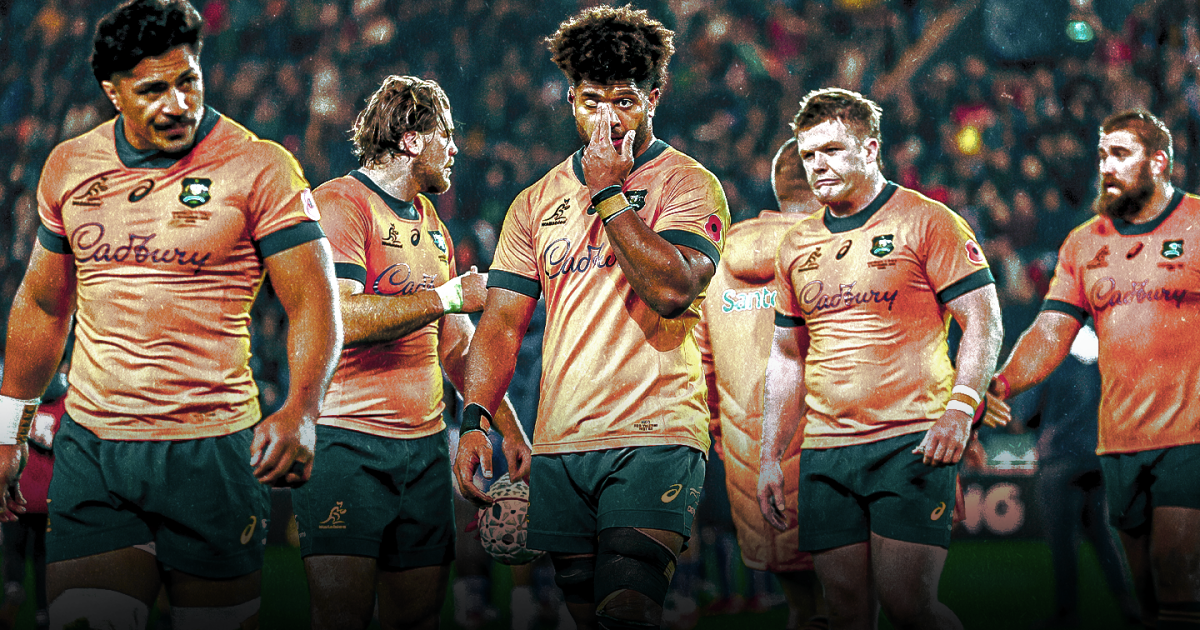It’s a frustrating place Wallabies fans, and the Wallabies squad, find themselves in this week. Frustrating and annoyingly familiar.
After backing up a strong first-half showing against Italy in Udine with their most disappointing capitulation of 2025, in my humble opinion, some very pointed but very reasonable questions have been asked of them since full-time was called on their 26-19 loss.
I can imagine Joe Schmidt asking his fair share of these questions, too, with his immediate response post-match echoing the thoughts of so many Australia fans who had set the alarm on Sunday morning.
“I’m pretty gutted, to be honest,” he told Stan Sport in Australia. “We just looked a bit flat. I said progress isn’t linear, but that was a flat performance. That’s a dip we can’t afford to have and we’ve got two massive games coming up now. We’re going to have to recuperate as best we can and throw everything into the Irish game now.”
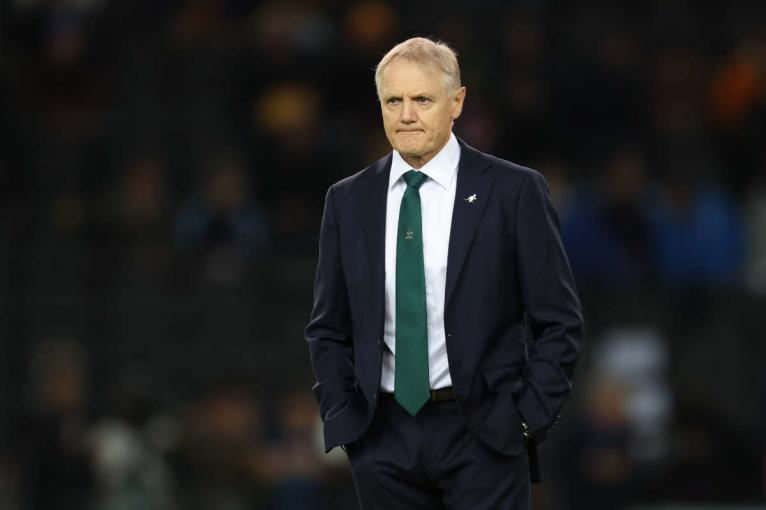 Schmidt’s side have lost five of their last six Tests, and eight of 13 overall this year so far (Photo Timothy Rogers/Getty Images)
Schmidt’s side have lost five of their last six Tests, and eight of 13 overall this year so far (Photo Timothy Rogers/Getty Images)
A few weeks back, I suggested the Wallabies were definitely a better team than the one which started the first Test of the year against Fiji, but I’m not sure I can hold that argument now. There’s a real ‘square one’ feel about them again, and despite the wins over the Lions and the Springboks only happening in August, they suddenly feel a lifetime ago.
A capitulation of their own doing
There’s a decent argument that Australia looked better against Italy than the week before against England, because there was no real decline at Twickenham, just a failure to get going in the first place. The England loss was a performance that fuelled thoughts of fatigue/too many Tests, a notion only strengthened by the loss to Italy.
The performance in Udine was certainly an in-game decline. After playing with nice shape and width in attack, the Wallabies looked well on top at half-time, having scored two tries-to-none. The Wallabies had nearly two-thirds of possession, more than half the territory share, and forced the Azzurri to make twice as many tackles.
Quite why that all stopped in the second half remains a mystery. The attacking width was abandoned for a narrow, largely one-out carry and pick-and-drive method that when combined with an attacking clean-out that lacked presence and urgency, literally played into the hands of the Italian breakdown – which grew in confidence and deadliness with every pilfer and ruck penalty they won.
The silver lining, the social media wags argued, was that at least all five tries in the match were scored by Australians: Louis Lynagh and Monte Ioane grabbing the Italians’ scores.
The Italians also found their way into the contest courtesy of way too many Australian mistakes and infringements – kicks out on the full, balls lost into contact, maul and breakdown infringements that enabled the Azzurri to draw level and then pull away with two converted tries in three minutes on the hour.
It surely can’t have been a half-time coaching message but equally, why would the players on the field in the heat of the battle just decide to ignore what they were doing 20 minutes earlier? It makes no sense either way.
“Second half, I just feel like we overplayed,” Schmidt said. “We were static and we really need to go back and just try to get a little bit more energy about us, particularly around that breakdown. We should not be giving up those breakdown penalties.”
The silver lining, the social media wags argued, was that at least all five tries in the match were scored by Australians: Louis Lynagh – son-of-Michael, brother-of-Tom – and former Melbourne Rebels flyer Monte Ioane grabbing the Italians’ scores.
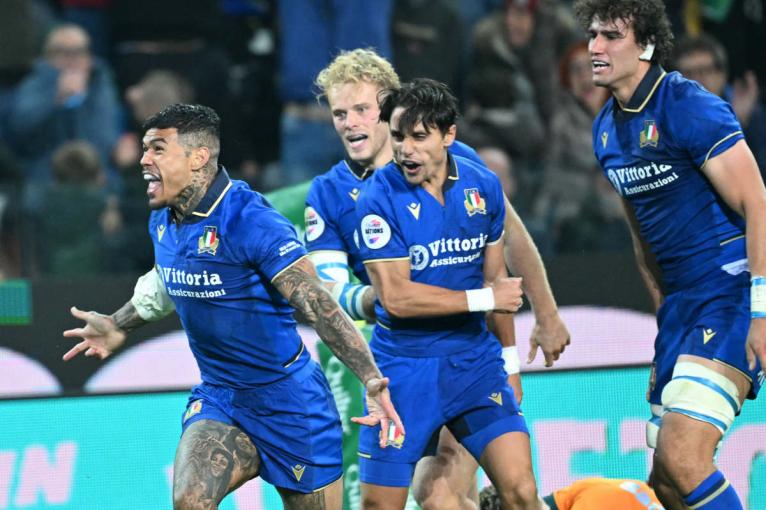 Monty Ioane’s try proved the winning score after a converted try from Louis Lynagh (second left) brought Italy level (Photo Stefano Rellandini/AFP via Getty Images)
Monty Ioane’s try proved the winning score after a converted try from Louis Lynagh (second left) brought Italy level (Photo Stefano Rellandini/AFP via Getty Images)
Regardless, this was a capitulation from the Wallabies and largely of their own making. Which is not to take anything away from Italy, who simply recognised that they only had to defend Australia’s narrow attack and wait for the inevitable gift turnover or penalty.
Mistakes are becoming fatal. Adjustment is needed.
How many times does something need to happen before it’s definitely a trend?
At some point between coming back from South Africa and resuming The Rugby Championship on home soil, a switch was flicked that meant the Wallabies started conceding turnovers and penalties, and seven games later, it’s the most definite of worrying trends.
Through the Lions Series and the South African tour, the Wallabies averaged just 12 turnovers and seven penalties conceded per game, with the 11 penalties in the third Lions Test in Sydney – quite remarkably, now – the only game among those five to reach double-digit penalties.
Since then, it’s been a very different story. The Wallabies are now out to more than 15 turnovers conceded every game, and more than a dozen penalties – hence why the Italians’ patience was so well rewarded on Saturday.
With two Six Nations heavyweights next up, inviting teams back into games or letting them get away because of things you keep doing is a recipe for disaster.
Three extra turnovers and five extra penalties every game will either invite teams back into games, make it impossible to catch them, or – as on the weekend – both.
In Udine, it was three first-half penalties in the Australian half that allowed the Azzurri to draw back to within three points at half-time. From there they simply had to overcome a try from a probable knock-on, stay patient, and wait for the rewards to arrive around the hour mark.
The Wallabies have to address this trend and adjust. Immediately. With two of the Six Nations heavyweights next up, inviting teams back into games or letting them get away because of things you keep doing is a recipe for disaster.
Last fortnight harder than it needed to be
Argentina’s big win over Wales on Sunday, following Australia’s loss to Italy, allowed Los Pumas to open the gap on the Wallabies to nearly one full ranking point, meaning Australia now almost certainly need to beat one of Ireland or France over the next two weekends if they want to get into the top six before next month’s draw for RWC2027.
The size of the Argentine win in Cardiff actually meant that a narrow Australian victory may well have kept the Wallabies in seventh place anyway, and still needing to win one of their final two Tests of the year.
But what has made the equation harder now is that the Wallabies have had a significant confidence dent over the last six weeks, while Argentina head to Murrayfield this week with momentum and ready to take on the Scots.
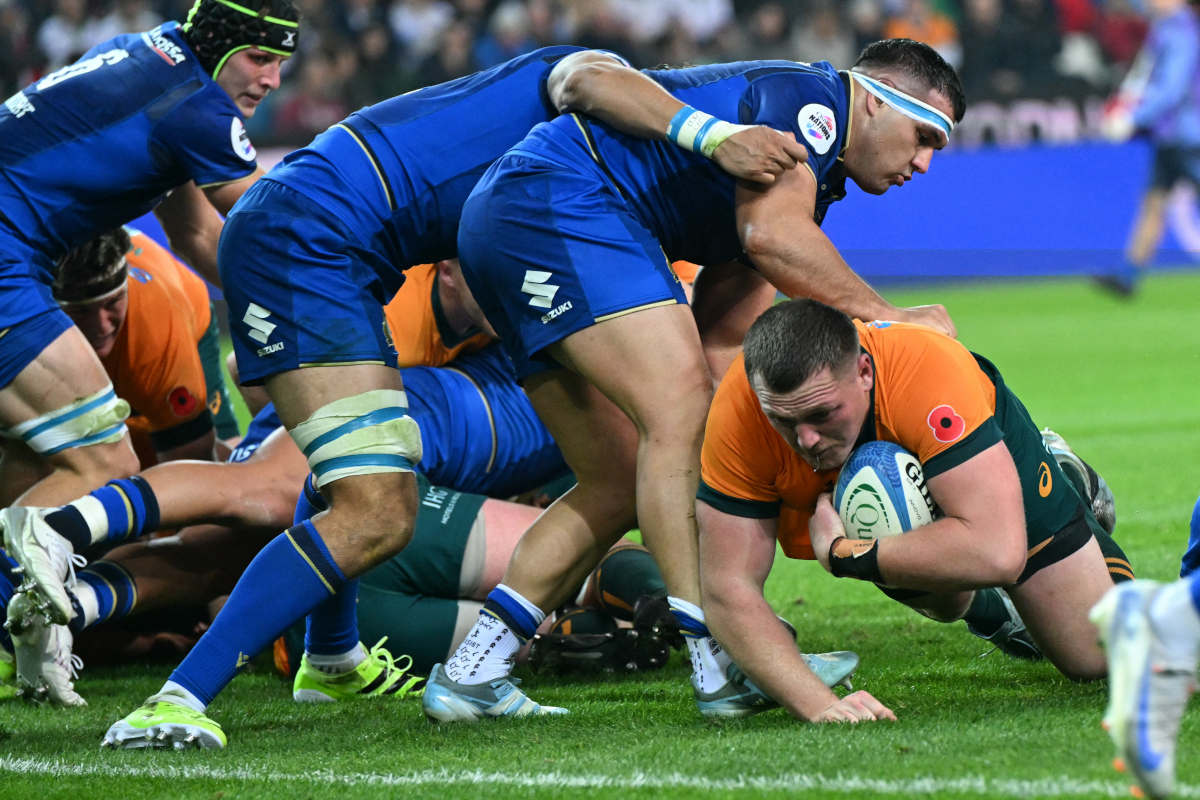 Angus Bell’s converted try put Australia in command at 12-6 up, but a host of errors allowed Italy back into the game (Photo Stefano Rellandini/AFP via Getty Images)
Angus Bell’s converted try put Australia in command at 12-6 up, but a host of errors allowed Italy back into the game (Photo Stefano Rellandini/AFP via Getty Images)
Certainly, a Scotland win on the back their performance against New Zealand and the confidence that surely comes with that, can’t be ruled out. Indeed, Australian fans are counting on it. But the best thing the Wallabies can do is find a way to beat Ireland on Saturday.
Look, stranger things have happened. The Wallabies and Ireland have always matched up well regardless of world rankings at the time, and the four most recent meetings in Dublin – in 2014, 2016, 2022 and 2024 – were all decided by just three points in Ireland’s favour.
Further, Ireland lost control of the game against the All Blacks in Chicago in an awful hurry, and then took the first half to work out how to get the upper hand against Japan last weekend.
Labelling them ‘vulnerable’ feels somewhat accurate, even if still with a touch of hope. But simply put, the Wallabies just have to find a way.
We’ve seen this movie so many times
“Is it better to be a consistently good team or an occasionally brilliant one?” asked fellow RugbyPass contributor Daniel Gallan on the weekend, albeit writing for The Guardian.
It’s a good question, one Wallabies fans have been asking for years. The evolution of the modern game has gone ahead of Australian rugby over the last decade at the very least, and save for a brief blip in late 2021, the Wallabies haven’t been a consistently top-four ranked side since June 2018.
The players are the actors and the coaches are the directors, and they’ve all come and gone. I can’t even tell if subsequent showings are remakes or sequels.
In all that time, the movie has stayed the same: early season promise and some good results to sow the first seeds of hope, followed by late season submissions that rip all that hope out, roots and all. The players are the actors and the coaches are the directors, and they’ve all come and gone. I can’t even tell if subsequent showings are remakes or sequels.
Gallan framed the question perfectly, and it’s hard not to nod all the way through as an Australian rugby fan.
“Schmidt has clearly given the Wallabies a plan, but plans need execution, and execution requires habit,” he wrote. “The best teams make the extraordinary seem routine; the Wallabies too often make the routine look extraordinary.”
Perfectly put. The Wallabies have done exactly this in 2025. The routine has looked extraordinary. It shouldn’t be like that, but isn’t that why Australia has been outside the top four for this long?
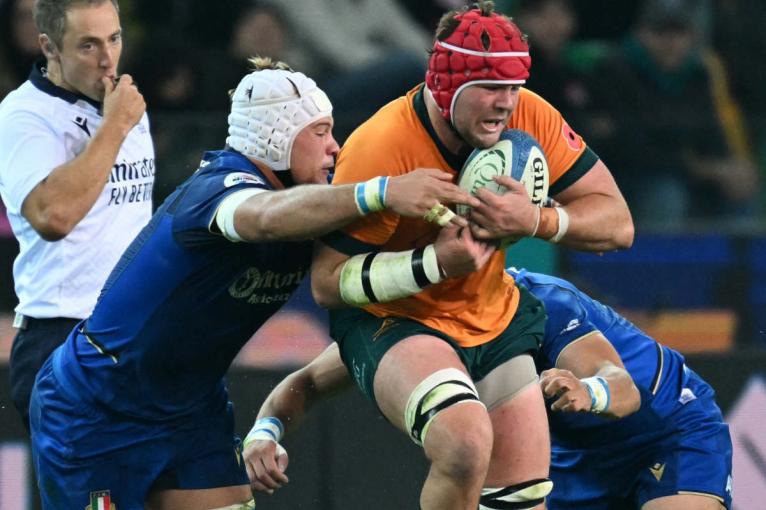 Australia remain trapped between a side capable of stunning highs but also major lows (Photo Stefano Rellandini/ AFP via Getty Images)
Australia remain trapped between a side capable of stunning highs but also major lows (Photo Stefano Rellandini/ AFP via Getty Images)
So is it better to be consistently good or occasionally brilliant? Well, I’m not sure. There’d be plenty of Wallabies fans out there who would say ‘both’, and perhaps they’re still convinced Australia can be a top-four side again.
“Australia remain trapped somewhere in between, capable of beauty, vulnerable to chaos, and still searching for the kind of steady excellence that turns potential into power. Until they find that rhythm, they’ll remain a team of flashes, not finishes,” Gallan concluded.
On current form, it’s hard to argue with this. The occasionally brilliant certainly makes the Ellis Park history possible, and that in term fuels the conviction that the Eden Park history will change some day. Maybe it will, but I certainly don’t know when. That’s why we keep watching this same movie.
So maybe consistently good is the goal. It sure would be nice to finish a season with more wins than losses, which has only happened twice in the last decade and is out of reach again this year. It sure would be nice to watch a different movie, too.

